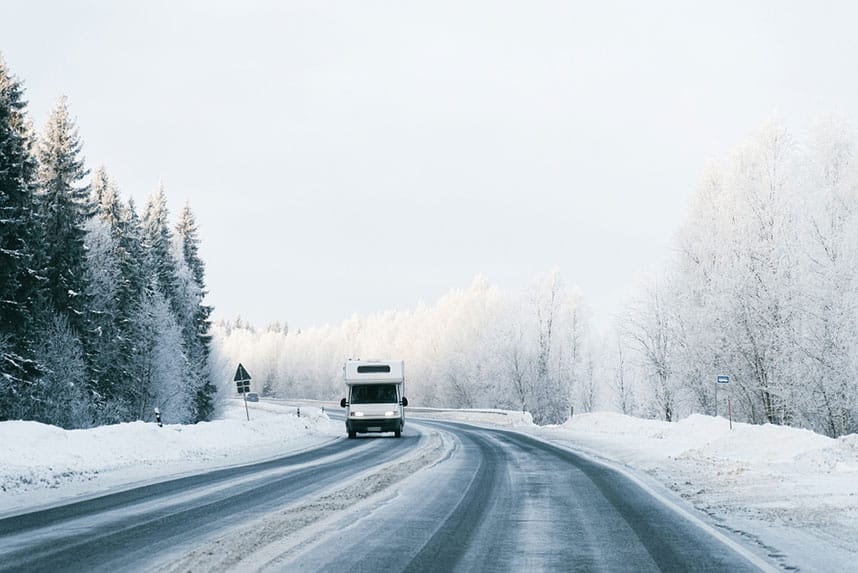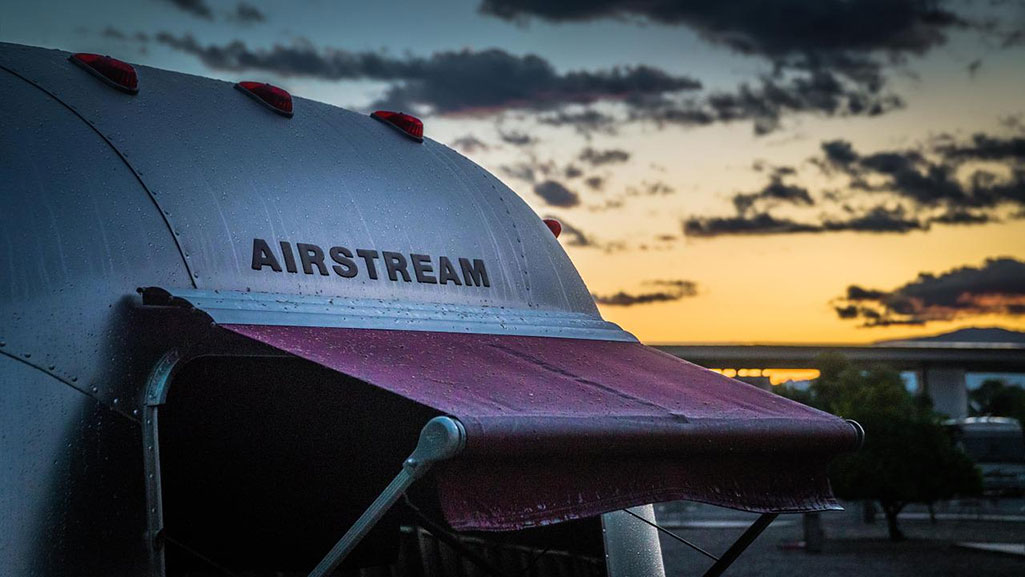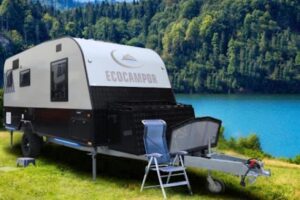Winterizing Your RV
Summer is the perfect time for traveling in an RV. You can tour the country meet interesting people, see beautiful landscapes, and camping in the wild places this earth has to offer.
But once summer has ended, and temperatures begin to fall as winter weather rolls in, you may notice your camper spending more weekends parked in your driveway than on the open road. Once this happens, you’ll need to consider putting “winterize the RV” on your weekend to-do list.

Winterizing an RV is essentially the process of preparing the various systems in your RV for freezing temperatures, rain, and pretty much any bad weather that the winter months can throw at your camper.
Some of the chores you’ll have to complete in order to properly winterize your RV include disconnecting propane lines, cleaning out food scraps (so as not to attract rodents), and installing protective covers on your tires.
Today though, we are going to focus on your RV’s plumbing system, as this system is highly susceptible to damage in freezing temperatures. When plumbing fails in an RV, there can be a domino effect of damage with the potential to wreak havoc on your camper, eventually damaging much more than just the plumbing system.
Plumbing System Winterization
As water freezes into ice, it expands. Typically not a problem, unless that water is housed within pipes or appliances, and has no extra room to expand into.
When this occurs, the expanding water has enough strength to burst water lines, crack water pumps and heaters, and blow out rubber seals and gaskets. All of these things are very harmful to the overall health of your RV.
Once freezing water has damaged your plumbing system, the next thaw will release the water housed in your plumbing lines into the rest of your RV. It will flood into your walls, cabinetry, storage containers, and onto your carpet and upholstery. If unnoticed, come spring you will be faced with enough rot, mold, and mildew damage to turn anyone’s stomach.

Beyond being simply gross, these types of damages can be so costly to repair, that some people choose to sell the damaged RV for whatever they can get and put that moldy mess in the past.
To avoid this nightmare, an autumn afternoon of RV winterization is time well spent.
Air Pressure Winterization
One way some people choose to winterize their water lines is by using compressed air to blow out all the extra water in their system.
This should be done after all water holding tanks are drained, cleaned, and left open, so that the water being blown out can immediately drain as well. After purging holding tanks, an air compressor is used to blast high-pressure air through the plumbing lines and appliances, ensuring they have no large quantities of standing water in them.

Some RV owners prefer this technique because it eliminates the risk of expanding water damaging your RV altogether.
RV Antifreeze Winterization
The more popular way to winterize RV plumbing systems is to add RV antifreeze to the water system and holding tanks. The antifreeze lowers the freezing temperature of the water, thus lowering the temperatures your system can withstand before incurring damage.
Is it Safe to Put RV Antifreeze in a Freshwater Tank?
During the winterization process, some people choose to pour RV antifreeze directly into their freshwater tank, and let the RV’s water pump send the solution through the water system.
This is safe to do only if you use propylene glycol based antifreeze, and make sure to thoroughly flush it out of your system when you de-winterize in the spring.
Types of RV Antifreeze
To understand what RV antifreeze is made of, it’s important to note that there are different types available. RV antifreeze can be categorized into two common compositions: ethanol-based and propylene glycol-based. Ethanol, which is an alcohol, is used in some RV antifreeze formulations. However, propylene glycol is the more prevalent and recommended ingredient in RV antifreeze.
Propylene glycol is a type of alcohol that serves as a safer alternative to ethylene glycol, which is found in automotive antifreeze and can be harmful if ingested. By using propylene glycol-based RV antifreeze, you ensure minimal risk to human health in case of accidental contact or consumption.
It’s important to follow the manufacturer’s instructions and use RV antifreeze specifically designed for RVs, as using automotive antifreeze can be detrimental to your health. Prioritize your safety by choosing the appropriate type of RV antifreeze for your needs.
Ethanol Based Antifreeze
Less popular every day, ethanol antifreeze uses ethanol as the main constituent to prevent your water lines from freezing. Ethanol is an alcohol that won’t freeze when subjected to freezing temperatures.
Think of that bottle of tequila you keep in the freezer: the tequila itself stays wicked cold, but never freezes solid. The ethanol prevents your water system from freezing in the same way.
Drawbacks to Ethanol Antifreeze
Ethanol based antifreeze is declining in popularity because it can leave an unpleasant taste in your water lines come spring, and is TOXIC to humans. This means that after winter, your water system will need to be meticulously purged of all antifreeze in order to be safely used again.

After several seasons of use, ethanol antifreeze can also dry out the rubber seals and gaskets in your plumbing system, leading to leaks and subsequent repairs. No fun at all.
Propylene Glycol Based Antifreeze
The queen of RV antifreezes, propylene glycol based antifreeze is a low-toxicity solution that is dyed pink to indicate it is for RV (and marine) use.
Propylene glycol antifreeze does not have the drying effect that ethanol has and will not dry out your seals and gaskets. In fact, propylene glycol is a lubricant and should help to preserve the sealing properties of gaskets in your system.
It is also non-flammable which makes it a shelf-storage safe product, giving you some peace of mind.
Is Propylene Glycol Antifreeze Toxic?
This RV antifreeze is a low-toxicity product and can safely be used to winterize water lines without as much risk of antifreeze poisoning. I say without as much risk because if consumed in large, concentrated quantities it can still be harmful to your health.
DO NOT DRINK ANY TYPE OF ANTIFREEZE, it will hurt you.
Drawback to Propylene Glycol Antifreeze
I crowned this antifreeze as queen because there are really no big drawbacks to using it. It does cost a bit more than other types of antifreeze but honestly the advantages outweigh the burden of cost by so much.
Antifreeze Blend
There are some products on the market that are a blend of ethanol and propylene glycol. Some RV owners go this route because it lands in the middle of the price spectrum, and has some properties of both ethanol and propylene glycol antifreezes.
Personally though, I would just go for the propylene glycol solution as it is the safest option on the market.
So, Is RV Antifreeze Toxic?
The toxicity of antifreeze is going to be entirely dependent on what the chemical composition of the antifreeze is. Some types are safe for human consumption in moderate amounts, some should never be consumed.
Make sure to carefully read the bottle of whichever antifreeze you choose to use so you have a clear idea of how safe it is to use in your RV. If you have further questions that the bottle hasn’t answered, try exploring the manufacturer’s website, or calling their customer support line to request more information.
Important note: Humans and animals have different reactions to the consumption of antifreeze.
Is RV Antifreeze Toxic to Humans?
When used as directed, RV antifreeze is specifically formulated to be non-toxic to humans. Unlike automotive antifreeze, which contains ethylene glycol and can be harmful if ingested, RV antifreeze is typically made from propylene glycol, a safer alternative. This means that in the event of accidental contact or consumption, RV antifreeze poses minimal risk to human health. However, it’s important to note that RV antifreeze is not intended for drinking purposes and should not be ingested. Its primary purpose is to protect RV fresh water systems and plumbing lines during winterization or colder months. Always adhere to the manufacturer’s instructions for proper handling and disposal of RV antifreeze.
Is RV Antifreeze Toxic to Animals?

Short answer: yes.
Household pets like cats and dogs are more susceptible to the toxicity of antifreeze because they are smaller than humans and have different biological makeups. When consumed, even in small quantities, antifreeze has the potential to harm or even kill cats and dogs.
This applies even to the relatively non-toxic propylene glycol antifreeze. Some very large dogs might be able to consume a very small quantity without adverse effects, but in cats, it is almost always fatal.
Why Are Animals So Interested in RV Antifreeze?
If you use antifreeze in your vehicles and also own a cat or dog, you may have noticed that they seem bizarrely interested in smelling and trying to taste both automotive RV antifreeze.
Why is that?
Because it is sweet. Being sweet in both smell and taste, RV antifreeze will attract most curious cats, dogs, or other critters hanging around your house.

So, keep the lids on your bottles tight and make sure to store all types of antifreeze on very high shelves or in cupboards in your garage and home.
If you spill antifreeze on the ground, thoroughly dilute it with many gallons of water from a hose. This will ensure that if your furry friend does lick at the spill site, they are only consuming trace amounts of RV antifreeze.
Is Antifreeze Environmentally Safe?
No. Antifreeze should be disposed of properly so as not to disrupt the ecological balance of your local environment.

Dumping automotive RV antifreeze on the ground can have several adverse effects that can and should be avoided:
- Antifreeze seeping into groundwater supplies can raise toxicity levels of local ground and well water.
- Plants and insects can be killed or made sick by the presence of antifreeze
- Local rodents and other small mammals may be attracted to antifreeze in the same way house pets are. Consumption will likely lead to the death or disease of these critters.
To dispose of your RV antifreeze properly, pour it into a drain that you know will lead to a wastewater treatment facility or dump it into a regular RV dump station.
Conclusion
In my humble opinion, the superior choice for RV antifreeze is going to be propylene glycol based. This will be the least-toxic option for you and other living things around you, and will also be the safest way to winterize your RV with antifreeze.
Take your time and winterize your RV thoroughly so as to protect your financial investment and avoid dealing with costly plumbing repairs.
Always be deliberate with antifreeze, from how you use it, to how it is stored and disposed of.



